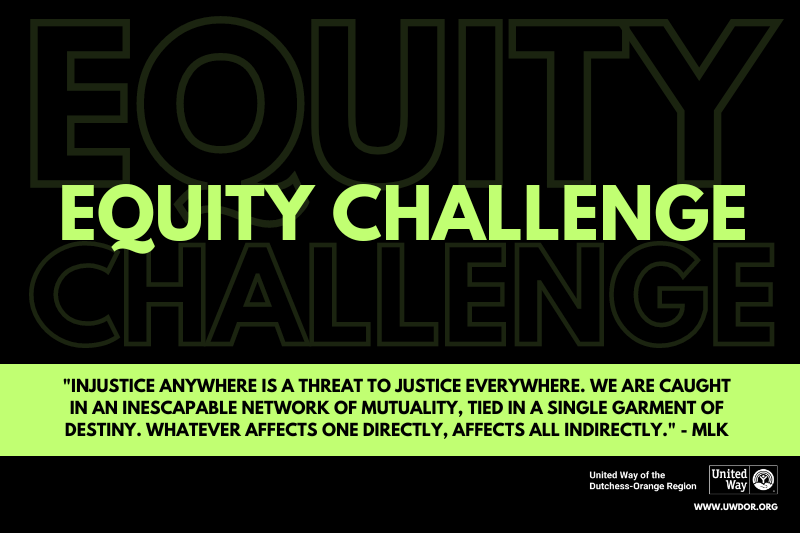Thank you so much for including me in this project. Thank you to the NYS Office of Mental Health for their support. We are thrilled to present the work we accomplished as part of the Stigma Reduction Project.
My name is Melissa Clark, VP of Community Impact at United Way of the Dutchess-Orange Region (UWDOR). UWDOR has a long history of Community Impact and anti-stigma practices. We were founded in 1937 and, working with our supporters, “fight for the Health, Education and Financial Stability for every person in our community.” We provide extensive capacity building and resources to our hundreds of local nonprofit partners, including funding, volunteers, essential items, training, food access programming, and a 24/7/365 human services hotline. Through our partnerships and programs, we can help 1 in 4 people in our community, over 214,000 people!
The Stigma Reduction Project had several components. We hosted MLK and Juneteenth Equity challenges that encompass a variety of diversity, equity, and inclusion (DEI) topics related to mental health, racial equity, gender equity, LGBTQIA+, ageism, and ableism. Each day, participants receive a link to an article, video, and podcast encouraging them to learn and unlearn themes DEI topics. The different modes are to accommodate different preferred learning methods.
Additionally, we hosted a Community Conversation around Food Insecurity and looked at the intersectionality between mental health, food access, and other social determinants of health. Community members and service providers attended. We also hosted two Nonprofit Professional Development Workshop days focused on DEI concepts and mental health stigma reduction. Attendees of all components were made up of different areas of the population, including hard-to-reach populations, BIPOC folks, and marginalized populations. In total, 1,008 people participated in various Stigma Reduction Project activities.
We are proud of our DEI work. DEI work has been our consistent focus, and we ensure it is at the top of our minds in all of the programming we execute. We have an internal DEI committee that plans and implements our internal programming. Each month, we focus on a different theme month. For example, February is Black History Month, March is Women’s History Month, and April is when we focus on neurodivergence. Committee members take turns hosting a monthly lunch and learning Zoom with videos and discussions. This venue is a safe space for staff to connect and discuss their experiences. Newer team members have mentioned that these opportunities demonstrate UWDOR’s commitment to inclusive practices.
The DEI Committee researches resources for upcoming equity challenges and ensures smooth implementation. Organizations may borrow any of the vetted resources by visiting www.uwdor.org/socialequitychallenge. I am also happy to speak with folks who would like to bring a similar program to their organization – you can email me at mclark@uwdor.org. Additionally, the DEI committee collects data to ensure the themes are specific to community-level feedback and interest. Pre- and post-surveys were completed for the different Stigma Reduction Project activities. Pre- and post-survey data were particularly helpful in determining peoples’ level of learning and suggesting topics for future activities. UWDOR staff members also participate in a dozen community coalitions and collect anecdotal data about DEI trends and emerging barriers. Measurement was managed by collecting registration data and tallying community outreach mechanisms, including social media, community listservs, email lists, and direct outreach.
We always want to be cognizant of potential participation barriers, especially for hard-to-reach populations. For these particular activities, that meant ensuring people had access to virtual learning, hosting activities that could be accessed at all hours of the day, and keeping in mind that some topics could be potentially uncomfortable for people who may have lived experiences related to their particular circumstances.
Best Practices for Program Replication
For organizations that may want to implement similar programs, best practices to consider are as follows:
Make DEI a permanent part of your internal and external organizational programming – This will build community and institutional trust and ensure your organization is a welcoming place for staff and volunteers.
Steal/borrow our research (uwdor.org/socialequitychallenge) – We have collected over 200 high-level, vetted DEI resources that may benefit your community and internal stakeholders.
Utilize several community outreach mechanisms – Consider expanding your methods to reach potentially marginalized populations.
You already have the resources – leverage them – Consider the resources you already have: staff, volunteers, interns, and Board Members. What experience can they bring to such an initiative?
Ensure roles are identified – Consider which staff/volunteers can work together to successfully roll out DEI programming for your community.
Measure for impact – Implement pre and post-surveys and other data collection methods that may strengthen this programming.
Consider alignment of priorities along with funding proposals – Most funders seek proposals demonstrating a commitment to DEI principles. You are showing your equitable and compassionate leadership by going above and beyond in this area.
Tell your story – Only you can speak to the community about the important work you do daily to empower your community. Likely, you are already utilizing many equitable community best practices. Make sure your community is aware of your great work!
Thank you again to Behavioral Health News for offering this opportunity to share our work! Thank you to the NYS Office of Mental Health for their partnership and support. If you have any questions regarding our work and bringing this work to your organization, please do not hesitate to contact me at mclark@uwdor.org. Thank you for all you do!
Melissa Clark is Vice President of Community Impact at United Way of the Dutchess-Orange Region (UWDOR).
This project was funded by the New York State Office of Mental Health and the New York State Tax Check-off Funds for Mental Health Stigma Reduction.








